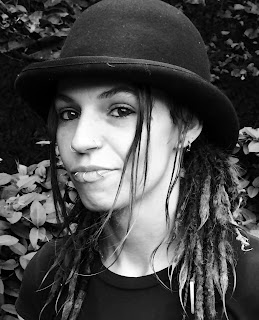Meet the author: B. Three Eagles
Making things weird.
If you knew you’d die tomorrow, how would you spend your last day?
If I could do anything—money was no limit, etc.—I would fly to Rome and sneak into the basement of the Vatican to see what all the fuss is about. I’ve heard all kinds of conspiracy theories about secret treasures supposedly hidden in there—apparently that’s where they hide all the really cool stuff that we regular folks aren’t supposed to know about—and I have this compulsive obsession for exploring the strange and mysterious. If it’s as awesome as everyone claims, that would be an epic last adventure.
Realistically, though, I’d probably just grab my closest friends and family and head out into the woods for a trail ride, maybe find a creek to play in along the way, and end up sitting around a fire somewhere, roasting some dinner and having a fireside jam session (acoustic, of course). Some of my best memories are just hanging out around a campfire with friends, telling stories and singing songs; it’s timeless and, for me, priceless. Maybe not epic, but still awesome.
In which way would you like to make a difference in the world?
This is kind of a difficult question to answer. I mean, without even really trying, I think anybody can look at the world and find a handful of things they would like to change. It’s hard to know what difference those changes would actually make, though.
I can’t pinpoint one specific, all important thing I would change. More than anything, I would just like to find a way for people to live in balance with the planet and everything else that has to share it with us. Our day to day lifestyle is so destructive, and there really is a better way. It wouldn’t necessarily be easy, and I know it’s not something that I or any one person could do by themselves, but I would love to be a part of the effort in building towards that future.
You’re lost in a desert and …
I’m lost in a desert and I’m freaking miserable. No trees, no water—it’s my own personal hell. I’m all for sunshine on a hot summer day, but the only sand I like is the sand along a shoreline. So I trudge along, delirious and irritated, following the unreachable mirage of a pristine swimming hole.
Suddenly, the ground starts to quake. A rift opens in front of me. ‘SARLACC!’ My brain screams franticly. I feel a rush of relief for the lack of teeth surrounding the hole, but now I’m gripped with apprehensive curiosity for what else it might be. A strange whirring noise fills the air—a soft, mechanical purr—and, despite my trepidation, I approach the hole, searching for the source. Stopping a few feet from the edge, I lean forward to get a look, but then fall back as a silver, saucer shaped object darts out from within the chasm. The noise grows louder—the saucer is hovering above me now. A small hatch opens, bathing my skin in eerie blue light and leaving me tingling all over.
The next thing I know, the sand is gone. I’m in a small room with metal walls. The ceiling and floor are translucent; I can see the sky above and the desert below. A section of the wall slides away with a hiss, leaving me face to face with a strange being. I can’t say what it looks like. I can see it, but I can’t seem to remember, even for a fraction of a second, what I’m seeing. The creature might as well be invisible.
Moments later I’m sitting in the cockpit of the strange craft, conversing with this being I’m still not sure I can see. The desert whips by beneath us, eventually giving way to a coastal region and, finally, the sea. All the while, the being is telling me the most intriguing tale of a world within our world. Apparently aliens aren’t alien at all; they come from inner-space, not outer. They are as sentient to our planet as we are, but they live in the center instead of on the shell. They don’t come topside very often anymore, on account of how many of them have ended up on a table in a lab somewhere, being dissected like frogs in a high school biology class. Apparently they find the practice offensive.
The pilot prattles on, speaking broken English, and with a very thick accent, and the landscape continues to change as it whips by below. Before I know it, a familiar sight looms into view—an overgrown drive at the base of a hill. The creature seems to know that this is my stop. It hands me a weird object—some kind of rainbow-ish metal disc—and says for me to call if I ever need a ‘Transport Across Xenolith Interplanetary’, or T.A.X.I, again.
Unfortunately, I can’t read the ‘card’. Its iridescent surface is lightly etched with squiggles and lines unlike any letters or numbers I’ve ever seen.
Oh well. At least I’m out of that damned desert.
Who is your hero and why?
My mom, hands down and without question. I know it may sound kind of cheesy, but she is a real life superhero. As a single mom with three kids, she worked 12-16 hour days at the hospital (saving lives, like any good hero), kept up with the house and homework and everything else that goes into raising children, and somehow still found time to coach little league and basketball. She’s compassionate and kind, and always optimistic, no matter how bad things may look. Through all of the hardship and struggle, she always kept her chin up and saw us through. I don’t know how she did it.
I get my stubborn—refuse to fail—outlook from watching her take on so many obstacles and never give up. I mean, hell, if she can do all that, anything I might face pales in comparison.
What were you doing the last time you looked at a clock and realized you had lost all track of time?
Researching the 13th month, which was apparently stolen from our calendar. Most people don’t know this, but many of the old tribal/clan based peoples (i.e. the Celts, Native Americans, Norse, etc.) operated on a thirteen month calendar. I kind of happened upon the topic accidentally while I was looking up something else and next thing I knew, several hours had passed and I had a small book’s worth of pages bogging down my printer.
What book do you think everyone should read?
 |
| Source: Goodreads |
The Machine Stops by E. M. Forster; an iconic example of how the science fiction of today is just the future of tomorrow. First published in The Oxford and Cambridge Review in November 1909, this book, to me, is the epitome of what sci-fi is all about.
Ray Bradbury once said that science fiction is the sociological study of the future—things that the writer believes are going to happen by putting two and two together. The Machine Stops proves Bradbury’s statement, as well as Forster’s talent for making such deductions. He wasn’t completely accurate in every aspect (at least, not so far), but many of the technologies he ‘invented’ are now present, at least in a similar form, such as instant messaging and the Internet. Forster foresaw that people would have a large number of friends they had never met in person, and that they would even prefer it that way. He highlights the ever growing disdain for direct experiences (seeing, smelling, or touching anything for yourself) which, in the book, is actually the main character’s greatest fear.
This story was pretty iconic for me, one of those that you read and never quite manage to forget. Even now, years after first reading it, the story kind of haunts me from the back of my mind, reminding me never to be too busy to go out and experience something new. I believe that our lives are our stories, every day is a page. Our experiences are important, good or bad, because they create our plots, build our characters, and, ultimately, make up our lives. Who wants to read a book with blank pages?
Favorite quote from the book, spoken by Kuno with his last breath: “I am dying – but we touch, we talk, not through the Machine.”
What kind of world ruler would you be?
Probably a terrible one. I don’t think I would make horrible choices or anything like that, but I doubt I would be very well liked. I’m too honest to be a politician, what with all the shenanigans and lobbying that goes into it. I’d have one good public address—my inauguration speech, most likely—and be impeached or assassinated.
Wow us with something we do not know.
I can read several archaic forms of ‘writing’, though, admittedly, some better than others, including five rune systems and two types of Native American pictographs. With some of these systems, it’s almost impossible to read them without making a mistake the first time through, since many of the symbols’ meanings change based on the context.





Leave a Reply